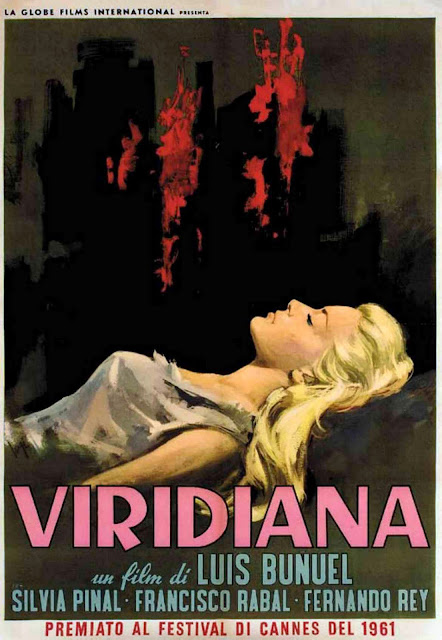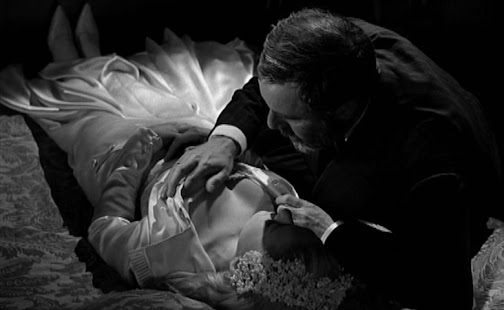Viridiana (1961)

Genre: Drama
Director: Luis Buñuel
Starring: Silvia Pinal, Francisco Rabal, Fernando Rey, Margarita Lozano
Language: Spanish
Duration: 90 min.
Summary:
Viridiana, a young nun about to take her final vows, pays a visit to her widowed uncle at the request of her Mother Superior.
Viridiana is a film directed by Luis Buñuel, co-written with Julio Alejandro and loosely based on a novel titled Halma by Benito Pérez Goldós. It was awarded the Palme d'Or at the 1961 Cannes Film Festival, sharing the award with Henri Colpi's The Long Absense.
Following a lengthy exile, the controversial Spanish director returned to his home country on the direct invitation of dictator Franco, and delivered an immediately banned scathing portrait of the regime and its biggest supporters, the Catholic Church.
The film stars Mexican starlet Silvia Pinal as the title character, a young novice ready to take her vows, but first she must pay a visit to her rich uncle and benefactor Don Jaime (Fernando Rey, in the first of four legendary collaborations with the director), who has invited her to his large estate for a few days. Viridiana doesn't want to leave the convent but on her Mother Superior's orders she reluctantly makes the trip and soon finds out that the outside world is a far crueler and unforgiving place for an innocent and idealistic girl than she could have imagined.
The acting is nothing remarkable, the characters simplistic, and the story is rather straightforward for a Buñuel film, but what makes this stand out is the elegant and methodical way in which he tears down Viridiana's and by extension the Vatican's naive outlook of the world. She's lusted after, drugged, groped, and bears witness to a terrible act. Then when her religious guilt overcomes her, she tries to make amends in her own noble way, but ultimately learns that her charity and good intentions are a foolish, unappreciated, and useless endeavor that could never match the overwhelming brutal and vicious nature of the world.
Buñuel drives home his point of view with two masterful scenes. The first which shows Don Jaime's son Jorge (Francisco Rabal) witnessing a poor tired dog that's tied beneath a horse drawn cart trundling it's way down the road. When the cart stops he saves the dog from it's suffering by purchasing it from the wagon driver. An otherwise touching moment that the director immediately counters. Once Jorge heads off with the dog, the camera pans back to show another wagon coming down the road with another dog in exactly the same predicament.
The second scene provides one of the most lasting images in all of cinema. A rather bleak but entirely accurate view of humanity that was responsible for the film's subsequent condemnation by the Vatican. It shows a room full of ungrateful beggars, ones who Viridiana has extended her exceedingly good will to, having an unauthorized feast in the estate mansion (while the grown-ups are away). What starts out as a tidy celebration, quickly descends into an all-out destructive orgy that includes an unforgettable reenactment of Da Vinci's The Last Supper and ends with Handel's Messiah playing on the gramophone. A truly brilliant sequence that leads perfectly into the film's cheeky and innuendo laden finale.
I'm not convinced that it's his best, but Viridiana is an excellent film that carries both historical and artistic importance and serves as an ideal introduction to the works of Luis Buñuel whose later more well known titles are for the most part highly surrealistic and challenging experiences.
Following a lengthy exile, the controversial Spanish director returned to his home country on the direct invitation of dictator Franco, and delivered an immediately banned scathing portrait of the regime and its biggest supporters, the Catholic Church.
The film stars Mexican starlet Silvia Pinal as the title character, a young novice ready to take her vows, but first she must pay a visit to her rich uncle and benefactor Don Jaime (Fernando Rey, in the first of four legendary collaborations with the director), who has invited her to his large estate for a few days. Viridiana doesn't want to leave the convent but on her Mother Superior's orders she reluctantly makes the trip and soon finds out that the outside world is a far crueler and unforgiving place for an innocent and idealistic girl than she could have imagined.
The acting is nothing remarkable, the characters simplistic, and the story is rather straightforward for a Buñuel film, but what makes this stand out is the elegant and methodical way in which he tears down Viridiana's and by extension the Vatican's naive outlook of the world. She's lusted after, drugged, groped, and bears witness to a terrible act. Then when her religious guilt overcomes her, she tries to make amends in her own noble way, but ultimately learns that her charity and good intentions are a foolish, unappreciated, and useless endeavor that could never match the overwhelming brutal and vicious nature of the world.
Buñuel drives home his point of view with two masterful scenes. The first which shows Don Jaime's son Jorge (Francisco Rabal) witnessing a poor tired dog that's tied beneath a horse drawn cart trundling it's way down the road. When the cart stops he saves the dog from it's suffering by purchasing it from the wagon driver. An otherwise touching moment that the director immediately counters. Once Jorge heads off with the dog, the camera pans back to show another wagon coming down the road with another dog in exactly the same predicament.
The second scene provides one of the most lasting images in all of cinema. A rather bleak but entirely accurate view of humanity that was responsible for the film's subsequent condemnation by the Vatican. It shows a room full of ungrateful beggars, ones who Viridiana has extended her exceedingly good will to, having an unauthorized feast in the estate mansion (while the grown-ups are away). What starts out as a tidy celebration, quickly descends into an all-out destructive orgy that includes an unforgettable reenactment of Da Vinci's The Last Supper and ends with Handel's Messiah playing on the gramophone. A truly brilliant sequence that leads perfectly into the film's cheeky and innuendo laden finale.
I'm not convinced that it's his best, but Viridiana is an excellent film that carries both historical and artistic importance and serves as an ideal introduction to the works of Luis Buñuel whose later more well known titles are for the most part highly surrealistic and challenging experiences.
— Bonjour Tristesse



























17 comments:
I was surprised at how much I liked this film. I think I've learned a lot about film since I watched it and would get more from it now, but I feel like I understood it pretty well when I saw it a couple of years ago.
Bunuel can be hit-or-miss for me, but this was a hit all the way.
Very good review BT. I love this series by the way! As you say it is not Bunuel best work but the crisp cinematography and the virulent criticism on catholicism makes it a must see.
I love the poster it is very 1960's and colourful!
This is the first Bunuel film that I saw and I really was amazed by it. Especially at how racy it was. The ending is just perfect.
Great review! I was exactly the same as you about this film. I liked it, but I prefer films like The Exterminating Angel. I think its a timing thing - back in its day it was so shocking and subversive, but so many of the images and messages have been done to death today.
Still, everything you say about the final scene and other aspects of the film are accurate. Great film. Great director! Great review!
I was on a serious Bunuel Kick after watching Discreet Charm and Obscure Object of Desire but couldn't get hold of anything then. Though I am seriously hoping I can see Viridiana and Belle De Jour this month.
I think this is one of Bunuel's best films, right up their with the masterworks Un Chien Andalou, L'Age D'Or, The Discreet Charm of the Bourgeoisie and The Phantom of Liberty. I loved everything about Viridiana, from its perfectly ironic choice of music in the opening credits to the wonderful closing line "I can't wait to shuffle the deck with my sister." Bunuel is a genius, and this is one of the biggest highlights of his career. Good review.
I really wanted to watch it when I was on some serious Bunuel kick after watching The Discreet Charm and Obscure Object of Desire but unfortunately could not get a hold of it. I am really hoping to see it this month along with Belle De Jour.
I just think it's a shame the acting isn't any better. It sounds pretty decent, some good acting would probably bring it up a half a notch.
Not quite a masterpiece for me, but I did thoroughly enjoy it. You make a good point about rewatching classics after learning more about film. That one of the main reasons I'm doing this series. Thanks for stopping by Steve.
Thanks. I've been meaning to do these Palme d'Or posts a little more often. Glad you agree with me. About the poster, I did a little bit of photoshop enhancing to the original faded image.
Yeah that ending, the music and the last line, just perfect.
You are right about the timing thing. Viewed from a historical perspective you can see how controversial it was, but it's in no way shocking compared to what's been done in the 50 years since.
Though, I think to properly judge a film you do have to consider when and where it was made, and in that case this one has a place amongst the most important.
I prefer his more surreal films but yeah there were some first class moments in this film. Especially that last line.
Thanks for dropping by Tyler.
I do recommend it. I've also been meaning to pickup the new blu-ray of Belle De Jour, it looks magnificent.
It's not bad acting just adequate, but it's the kind of fable like film where the acting doesn't matter so much.
I don't know how I missed this one.
Luis Buñuel is one of my all-time favorite movie-makers, and I just admire Viridiana for its sheer simplicity in comparison to his complex, surreal masterpieces. IMO, the two scenes that you have described in your review are two of the most powerful scenes ever filmed in cinema and while both of them are just perfect, I like the former better because of its subtle implications. I simply love the way Buñuel depicts Bourgeoisie plight in Viridiana as well as in Diary of a Chambermaid. But, it's Belle de Jour that happens to my most favorite.
Btw, please do check out my review of Viridiana at:
http://www.apotpourriofvestiges.com/2012/02/viridiana-1961-bunuels-case-study-on.html
I think I prefer Buñuel's later work, but there is something special about the simplicity of this, and of course the big middle finger to Franco and the church.
Post a Comment